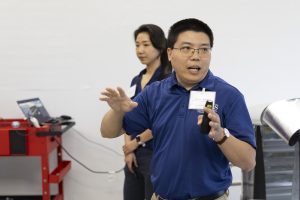Responsible use of artificial intelligence (AI) holds tremendous potential to make our world more prosperous and secure, while misuse of AI can lead to cybersecurity issues. Knowing that, White House officials toured the University of Florida Gulf Coast Research and Education Center (GCREC) last week.

During a visit to Tampa, Acting Principal Deputy National Cyber Director Jake Braun joined UF officials to tour the center, learn about the artificial intelligence-based science it facilitates and discuss opportunities available to ensure cybersecurity is incorporated into the center from the very beginning.
White House staff were briefed on various AI-related research by GCREC faculty. Center Director Jack Rechcigl said the visit should help him and the statewide AI research team better understand the importance of securing AI-obtained data.
“If you have AI systems supporting the farm, outsiders could shut down the farm if cybersecurity is weak,” he said, a move which could disrupt food supply.
Scott Angle, UF provost and former UF senior vice president for agriculture and natural resources, attended the tour and said afterward that it served as a “wake-up call.”
“We need to double down on cybersecurity,” Angle said.
When Angle led UF/IFAS, he galvanized its robust contributions to UF’s overall AI program. The institute has hired 15 faculty members who study how AI can help improve technology for agriculture and natural resources, sectors important to Florida’s growth. UF faculty also use HiPerGator, the fastest AI computer in U.S. academia.
Braun brought a team to GCREC on March 28, and he came away impressed by how UF/IFAS is using AI to help agricultural producers.
“It’s encouraging to see that UF is using the federal CHIPS and Science Act to secure funding for cybersecurity,” Braun said. “We also wanted to see what was going on here (at GCREC). It’s amazing.”
Braun added: “As more AI-centered technologies are funded and built – thanks to President Biden’s Investing in America agenda – we want to make sure that cybersecurity is built in from the beginning. We know that this funding and attention to cyber will not only help these systems be more secure but will also facilitate good-paying jobs in cybersecurity. The incredible innovation happening at the University of Florida Gulf Coast Research and Education Center is a prime example of the fact that we need cybersecurity funding, leadership and talent in every industry, especially in agriculture.”
The visit was prompted when the White House Office of the National Cyber Director decided to participate in a cybersecurity conference in Tampa last week and took some time to visit the center.

The tour included:
- Natalia Peres, professor of plant pathology. Peres showed how she hopes to leverage AI technology to develop an app that farmers can use to detect crop diseases faster.
- Kevin Wang, assistant professor of agricultural and biological engineering. Wang talked about how he is using AI to help plant breeders develop pest- and disease-resistant crop varieties.
- Dana Choi, assistant professor of agricultural and biological engineering. Choi presented her digital twin technology, which simulates strawberry fields for use in year-round research.
- Nathan Boyd, professor of horticultural sciences. Boyd discussed his precision weed sprayer, which uses AI technology to kill only weeds – and not the crops surrounding them.
GCREC not only has several faculty who work on AI-related research, they’re planning to build the Center for Applied Artificial Intelligence in Agriculture. In collaboration with the Florida Institute for Cybersecurity Research and inspired by the National Cyber Workforce and Education Strategy, cybersecurity will be infused in the hub’s efforts.
The 35,000 square-foot center is envisioned as a facility for scientists across Florida to collaborate to solve problems plaguing growers and to do so in a relatively short amount of time, using AI technology.
Economic benefits of the center for Hillsborough and Manatee counties include:
- improving agricultural production and leading to more technology focused jobs.
- developing new research and teaching faculty.
- drawing new industries to Florida with resources and expertise to support tech start-ups.
- providing training programs for industry, farmers, students and the public.
While anticipating construction of the AI center, Rechcigl looks forward to next steps in working on strengthening cybersecurity to protect the food supply chain.
“We’re grateful that the White House sent senior staffers to visit us at GCREC,” Rechcigl said. “Now that they’ve toured our facility, we hope to work with them to enhance cybersecurity precautions to protect the data produced by AI for growers and the public.”
Click here for more information about the visit to GCREC by the Office of the National Cyber Director.
###
ABOUT UF/IFAS
The mission of the University of Florida Institute of Food and Agricultural Sciences (UF/IFAS) is to develop knowledge relevant to agricultural, human and natural resources and to make that knowledge available to sustain and enhance the quality of human life. With more than a dozen research facilities, 67 county Extension offices, and award-winning students and faculty in the UF College of Agricultural and Life Sciences, UF/IFAS brings science-based solutions to the state’s agricultural and natural resources industries, and all Florida residents.
About AI at UF
The University of Florida is making artificial intelligence the centerpiece of a major, long-term initiative that combines world-class research infrastructure, cutting-edge research and a transformational approach to curriculum. UF is committed to building the nation’s first AI University by offering artificial intelligence courses to all students in its 16 colleges through our AI Across the Curriculum program. Our faculty and students can analyze vast amounts of data that can impact our country’s biggest challenges with HiPerGator, the most powerful, university-owned supercomputer in the nation.
 3
3
